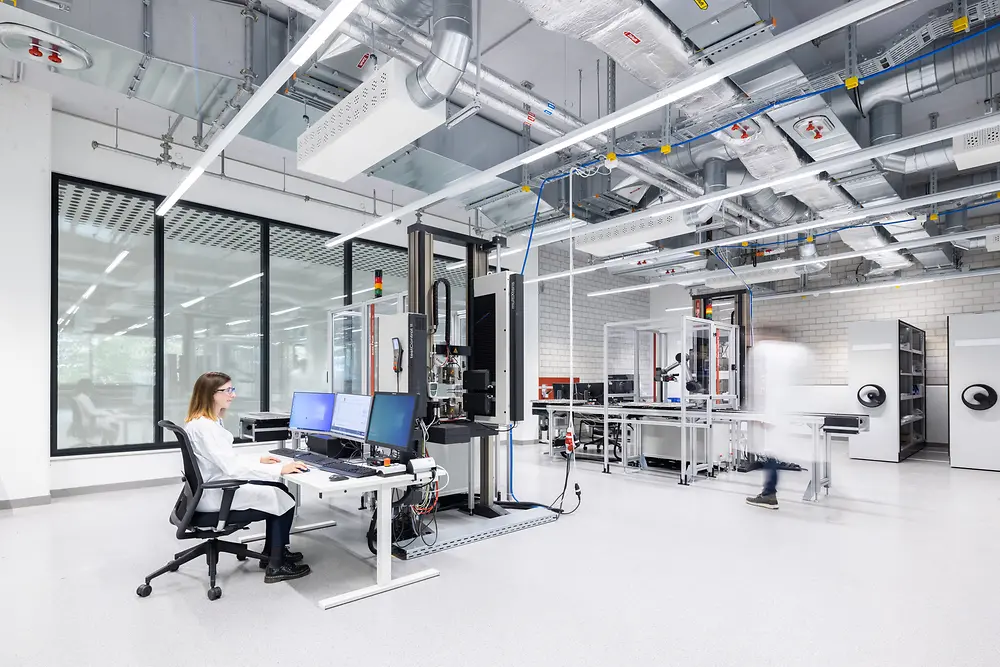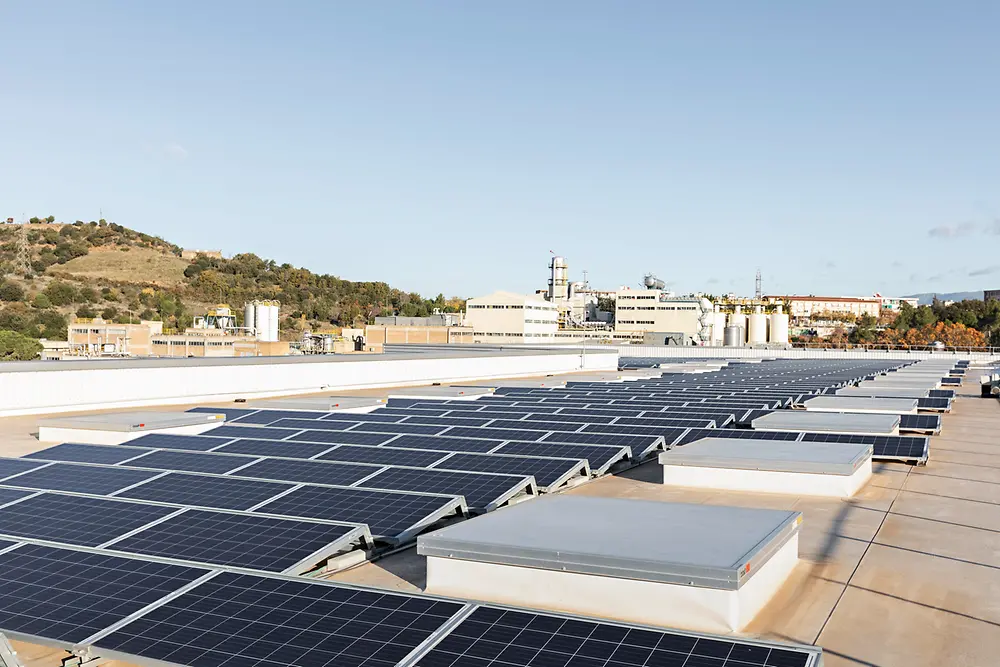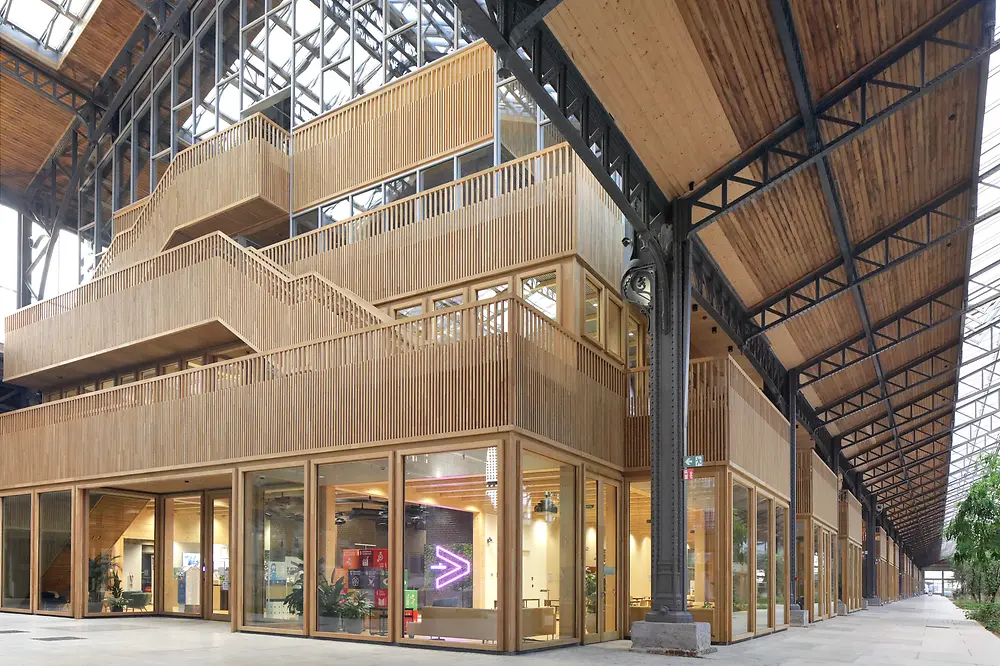Learn more about Henkel Brands & Businesses in UK & Irelands: Includes useful information about the brands, technologies and latest innovations in our business areas: Henkel Adhesive Technologies and Henkel Consumer Brands.
How innovative solutions from Henkel Adhesive Technologies are driving sustainability in the industry
Climate change, environmental pollution, and the scarcity of resources are posing global challenges to mankind. And while sustainable management and actions are becoming the focus of attention, requirements and demands for the industrial sector are changing. From material and energy consumption to the reduction of emissions and waste – companies are the key contributors for the protection of the planet and the preservation of quality of life with their innovative solutions. This applies both to their production sites and the entire value chain – from purchasing raw materials, through manufacturing and logistics, to the use and disposal of final products. In other words, everywhere where adhesive solutions can be found as well.
Sustainability in the industrial sector: How the transformation to value-creating growth can succeed
Henkel has set ambitious targets as part of its sustainability strategy. In order to reduce CO2 emissions, our production will become climate-positive by 2030. In addition, Henkel is committed to building a circular economy and is working with various partners along the entire value chain.
The Adhesive Technologies business unit plays an important role with its adhesives, sealants, and functional coatings. As a global market leader, the business unit develops highly effective solutions through pioneering innovations and intensive partnerships with its customers from a wide range of industries. Be it in automotive engineering, electronics, medical technologies, or the food industry – solutions and technologies from Adhesive Technologies are everywhere.
Working with customers means much more than merely supplying products and solutions. It is about being a partner and working with expert teams to develop tailored solutions that enable our customers to reduce their environmental footprint. The focus lies on saving emissions and energy, building a circular economy, and striving to optimize the safety of products.
Paving the way for e-mobility
E-mobility is one climate-friendly sector that is rapidly gaining momentum. And Adhesive Technologies is actively shaping the future of mobility. "As a leading partner to the automotive industry, we are proud to pave the way for electric vehicles by enabling better, safer, and more cost-effective battery technologies," says Frank Kerstan, Head of Sales and Business Development E-Mobility Europe. One key to safer and more efficient battery performance is thermal management.
Henkel experts have developed thermal interface materials that are used in-between the battery and the vehicle floor. The materials ensure that the battery does not overheat by dissipating excess heat to the outside. Yet, how powerful a battery is and how long it lasts not only depends on thermal management. It must also be protected from environmental influences such as moisture, dust, or dirt. At the same time, it must be easily accessible in case repairs are needed. The adhesive technologies of the future must therefore meet both requirements: Sealing the battery system and enabling the batteries to be opened for maintenance work without great effort.
However, it is not just the battery that needs to be easily accessible for maintenance and component replacement. The same applies to other car parts. Adhesive Technologies has developed debonding solutions for this purpose. Debonding ("ungluing") has enabled great progress, for example, in the repair of car headlights. For defective lights manufactured with conventional adhesives, it was previously impossible to open the casing without damaging it. Henkel has developed an adhesive that makes it easy to open the casing to replace components inside the headlights such as a defective LED module. This way, it is not necessary to replace the entire headlight.
However, debonding does more than just extend the life of products. It is also a lever to recover the value of materials at the end of a product's life cycle. Henkel’s adhesive technologies also promote the separation of materials that cannot be recycled collectively. This allows product parts to be reprocessed and reused.
Consuming less energy with wood as construction material
"We see wood construction as a great opportunity for sustainability. And with our high-performance adhesives, we can help promote this construction method," emphasizes Christian Fild. The Head of Global Engineered Wood points out two advantages. For instance, wood as a building material consumes less energy in production than concrete and steel while also storing CO2. In addition, a lot of construction steps can be done in a factory. At the construction site, the building elements then only have to be assembled. "This saves construction companies a lot of expenses while it ensures high quality at the same time," says Christian.

We see wood construction as a great opportunity for sustainability. And with our high-performance adhesives, we can help promote this construction method.
Christian Fild, Head of Global Engineered Wood at Adhesive Technologies
It is therefore not surprising that wood is increasingly in demand as a building material worldwide. In Milwaukee, USA, the Ascent Tower is being built – at 80 meters high, it will be the tallest solid wood building in the world. In Düsseldorf, Germany, the construction of the wood hybrid building "The Cradle" is almost finished. Its building materials can largely be reused.
The demands for adhesives in wood construction are high: in terms of durability and strength as well as environmental compatibility, fire protection and health risks. Henkel has developed special high-performance products for this purpose, which are characterized by two properties in particular. First, the adhesives do not contain formaldehyde, which can have negative health impacts. Secondly, Henkel adhesives can be used for fast, precise, and clean production.
Focus on renewable raw materials
The raw materials purchased also play a central role on the road to greater sustainability, as they account for the largest share of Adhesive Technologies’ overall CO2 footprint. The direction is clear: moving away from fossil carbons such as crude oil and natural gas towards renewable carbon, which can be obtained from biomass. "Our goal is to launch more products that are based on renewable carbon," says Adrian Brandt, Head of the Bio-Renewable Materials research platform.

Our goal is to launch more products that are based on renewable carbon.
Adrian Brandt, Head of the Bio-Renewable Materials Research Platform for Adhesive Technologies at Henkel
With Technomelt Supra ECO, Adhesive Technologies has developed a new hotmelt adhesive for packaging containing up to 98 percent* bio-based raw materials. Until now, conventional hotmelt adhesives for packaging have usually contained no more than 50 percent bio-based raw materials. Previously, it was not possible to increase this share, as it severely impacted customers' production processes.
Experts at Adhesive Technologies have developed a solution for these issues. "With the ability to use more bio-based raw materials without making sacrifices in manufacturing, we were able to develop an innovative technology that will continue to lead our industry into the future," says Adrian. And one that helps customers reduce their environmental footprint, too.
The focus on renewable materials is also visible in other areas: As part of a broad portfolio of adhesives, Henkel also supports customers in the production of sustainable paper straws. Thus, contributing to the gradual replacement of plastic straws with the more sustainable option. In addition to sustainability, the health of consumers is of utmost importance to Henkel. The water-based adhesives meet the highest food safety standards.
Making medical technology safer and more reliable
Safety is also a priority when it comes to medical devices. More and more people are using digital devices to monitor their vitals in real-time. In the process, the devices are becoming smaller and more user-friendly so they can be easily worn on the body. This presents device manufacturers with new challenges in development and assembly, as the components are becoming more complex in shape. At the same time, the requirements for flexibility and functionality are increasing. In the case of wearables (electronic devices that are worn on the body or integrated into clothing) every single component – from the internal circuit board level to the housing – must be protected.
Solutions by Adhesive Technologies are used, for example, in digital devices that help monitor the blood sugar levels of diabetics. The monitors are attached to the patients’ skin, which makes life easier by eliminating the need to take regular blood drops from their fingers. In the past, the adhesive that bonds the plastic components of the monitor together often contained isobornyl acrylate, an ingredient that triggers allergic reactions in some people.
Henkel experts have succeeded in developing adhesive technologies without isobornyl acrylate. "Our adhesives are dermatologically safe and free of allergenic ingredients," explains Thomas Silva, Global Business Development Manager for Medical Wearable Device Solutions in the Adhesive Technologies business unit. The goal, he says, is to optimize diagnostics and improve patient outcomes. "We have succeeded in doing exactly that with this product. It is a good example of how our innovative adhesive solutions make applications in medical technology safer and more reliable," Thomas emphasizes.

Our innovative adhesive solutions make medical technology applications safer and more reliable.
Thomas Silva, Global Business Development Manager for Medical Wearable Device Solutions at Henkel
Greater sustainability in the industrial sector requires a holistic approach, which Henkel is taking with its adhesives solutions. By combining technical expertise in materials with science-based innovations, our Adhesive Technologies business unit supports industrial customers and business partners in achieving their sustainability goals. Tailored solutions help to increase energy and material efficiency, return valuable resources to the cycle, and improve safety in both manufacturing and application as well as for consumers.
* This is a combination of direct biobased material and certified mass balanced material.
Climate Action
Driving transformational impact
Heat waves, an increasing number of hurricanes, and rising sea levels. A few degrees might not seem like they would make much of a difference, but they do when it comes to the future of our planet. We need to act not only for ourselves, but so that future generations can also live a good life sustainably.












